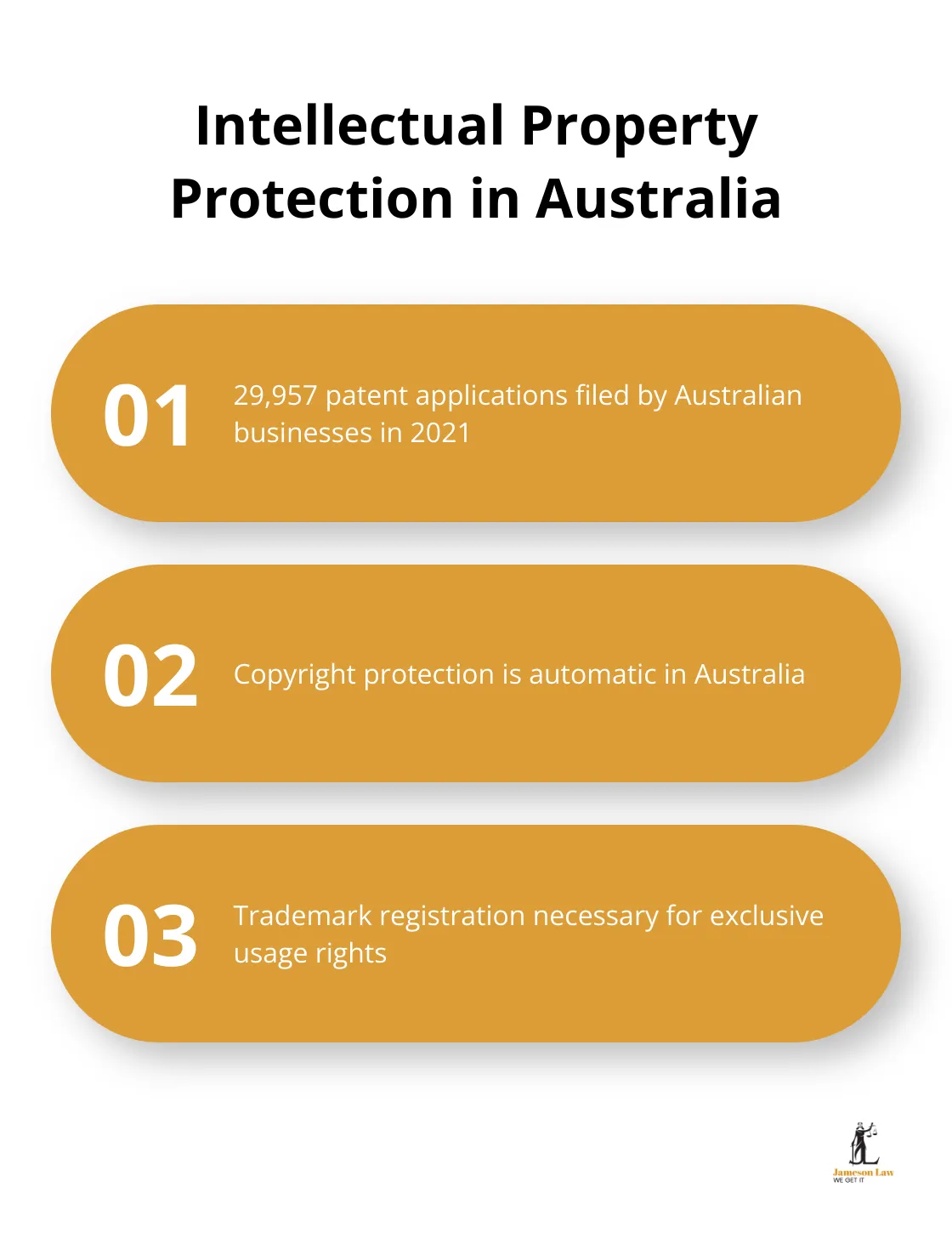Corporate law vs commercial law: two terms often used interchangeably, yet distinct in their focus and application.
At Jameson Law, we frequently encounter confusion surrounding these legal domains.
This blog post aims to clarify the key differences between corporate and commercial law, shedding light on their unique roles in the business world.
What is Corporate Law?
Corporate law forms the foundation of business operations in Australia. It regulates the formation, structure, and management of companies, ensuring they operate within legal boundaries. Corporate law primarily addresses the rights and duties of shareholders, directors, and other stakeholders involved in a company’s affairs.
Company Formation and Structure
Selecting the right corporate structure is essential when starting a business. In Australia, the most common types are proprietary limited companies (Pty Ltd) and public companies limited by shares. Each structure has its own set of rules and regulations. For instance, a Pty Ltd company can have up to 50 non-employee shareholders, while public companies have no such restriction.
The Australian Bureau of Statistics provides data on actively trading businesses, including rates of entry to and exit from the market sector of the economy, and rates of business survival.
Shareholder Rights and Corporate Governance
Shareholders own a company, and corporate law protects their rights. These rights include voting on major company decisions, receiving dividends, and accessing company information. The Corporations Act 2001 serves as the primary legislation that outlines these rights in Australia.
Corporate governance is another significant aspect of corporate law. It encompasses the systems and processes that direct and control companies. Effective corporate governance practices can improve company performance and reduce the risk of corporate scandals.
Mergers and Acquisitions
Mergers and acquisitions (M&A) are complex transactions that fall under corporate law. In 2022, 1,699 deals were announced locally, with publicly disclosed deal values reaching US$78bn. These transactions require careful navigation of legal requirements, including due diligence, shareholder approvals, and regulatory compliance.
Corporate lawyers play a vital role in M&A deals. They ensure all legal aspects are addressed and protect the interests of all parties. Their responsibilities range from drafting agreements to negotiating terms and managing the legal aspects of the integration process.

As we shift our focus to commercial law, it’s important to note that while corporate law primarily deals with the internal workings of companies, commercial law governs the external relationships and transactions between businesses and other entities.
What is Commercial Law?
Commercial law forms the foundation of business transactions and relationships in Australia. This legal framework ensures smooth operations in the commercial sector.
Contract Law: The Foundation of Business Transactions
Contract law stands at the core of commercial law. Australian businesses engage in numerous agreements daily, ranging from simple sales contracts to complex multi-party deals. Understanding the fundamentals of contract law is essential to protect your business interests.
In Australia, verbal contracts can be legally binding (although written contracts are always preferable). A well-crafted contract can prevent costly disputes and protect your business interests.
Intellectual Property: Safeguarding Business Assets
In today’s knowledge-driven economy, intellectual property (IP) often represents a company’s most valuable asset. In 2021, Australian businesses filed 29,957 patent applications (according to IP Australia), highlighting the growing significance of IP protection.
IP law encompasses trademarks, patents, copyrights, and trade secrets. Each IP type requires specific protection strategies. For instance, while copyright protection is automatic in Australia, trademark registration is necessary to secure exclusive usage rights.

Consumer Protection: Striking a Balance
The Australian Consumer Law (ACL) outlines the rules businesses must follow when interacting with consumers. It covers a wide range of areas, from product safety to unfair contract terms.
Consumer guarantees form a key aspect of the ACL. These guarantees are based on the same core principles as implied warranties and conditions that previously existed in state and territory laws.
In 2022, the ACCC imposed over $44 million in penalties for consumer law breaches, underscoring Australia’s commitment to consumer protection.

Competition Law: Promoting Fair Business Practices
Competition law plays a vital role in maintaining a healthy business environment. The Competition and Consumer Act 2010 prohibits certain practices that may limit or prevent competition in a competitive market.
The Australian Competition and Consumer Commission (ACCC) enforces these laws to ensure fair competition and protect consumers. Businesses must understand and comply with these regulations to avoid hefty fines and reputational damage.
International Trade Law: Navigating Global Markets
As Australian businesses increasingly engage in international trade, understanding international trade law becomes essential. This area of commercial law covers import/export regulations, customs duties, and international contracts.
The World Trade Organization (WTO) agreements, to which Australia is a signatory, provide the framework for international trade. Businesses involved in cross-border transactions must navigate these complex regulations to ensure compliance and smooth operations.
Commercial law’s complexity underscores the importance of expert legal advice. Whether you’re drafting contracts, protecting IP, ensuring consumer law compliance, or expanding internationally, professional legal guidance can save time, money, and stress. As we transition to examining the key differences between corporate and commercial law, it’s clear that both play integral roles in shaping the Australian business landscape.
How Corporate and Commercial Law Differ
Scope and Focus
Corporate law primarily deals with the internal affairs of companies. It governs how businesses form, structure, and manage themselves. Commercial law, in contrast, focuses on external business relationships and transactions.
When setting up a company in Australia, corporate law dictates the process of incorporation, shareholder agreements, and corporate governance structures. Commercial law comes into play when that company enters into contracts with suppliers or deals with consumer protection issues.
Client Base and Transaction Types
Corporate lawyers typically work with companies, their shareholders, and directors. They handle matters such as mergers and acquisitions, corporate restructuring, and compliance with the Corporations Act 2001.
Commercial lawyers have a broader client base. They might represent individuals, small businesses, or large corporations in various transactions. These could include drafting and negotiating contracts, resolving disputes, or advising on intellectual property rights.
Legal Frameworks
Corporate law in Australia operates primarily under the Corporations Act 2001, which provides a uniform national framework for corporate regulation. This Act covers everything from company registration to directors’ duties and corporate insolvency.
Commercial law draws from a wider range of legislation. This includes the Competition and Consumer Act 2010, the Australian Consumer Law, and various state and federal laws governing specific industries. For instance, a commercial lawyer might need to navigate the Personal Property Securities Act 2009 when dealing with secured transactions.
Required Expertise
Corporate lawyers need in-depth knowledge of corporate structures, governance, and regulatory compliance. They must stay updated on changes to corporate regulations and ASIC guidelines.
Commercial lawyers, while also needing a broad understanding of business law, often specialise in specific areas such as contract law, intellectual property, or competition law. They must excel at interpreting and applying various statutes and case law relevant to business transactions.
For businesses, understanding these distinctions is important when seeking legal advice. A startup might need a corporate lawyer to help with company formation and shareholder agreements, while an established business might require a commercial lawyer to draft complex supply agreements or navigate international trade regulations.
Final Thoughts
Corporate law and commercial law serve distinct purposes in the business world. Corporate law governs the internal workings of companies, while commercial law addresses external business relationships and transactions. Understanding the differences between corporate law vs commercial law helps businesses navigate their legal landscape effectively.
We at Jameson Law offer comprehensive legal services across various practice areas, including commercial law. Our team of experienced lawyers provides tailored advice and representation to help businesses handle both corporate and commercial legal matters. We strive to achieve the best outcomes for our clients in the Australian business landscape.
In today’s dynamic business environment, knowledge about corporate and commercial law is essential for sound decision-making and interest protection. Partnering with knowledgeable legal professionals ensures that business operations comply with regulations, maintain efficiency, and position themselves for growth in the competitive Australian market. Our expertise equips us to handle a wide range of legal challenges businesses may face.













